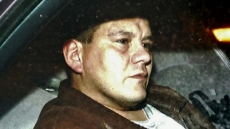COQUITLAM, B.C. — A man found not criminally responsible for killing his three children because of a mental disorder is making slow progress but still faces serious anger issues, a psychiatrist says.
Dr. Marcel Hediger told a British Columbia Review Board hearing Wednesday that it's unlikely he would recommend Allan Schoenborn be granted supervised outings into the community within the next year, saying he would first need to see a sustained period of at least six months of healthy anger management.
The board granted the director of a psychiatric hospital in Coquitlam, B.C., the discretion to allow Schoenborn escorted outings into the community two years ago, but he still hasn't been allowed to leave.
"Mr. Schoenborn quite consistently doesn't feel he has a significant anger-management issue," Hediger told the three-person panel.
"He does say he has a short fuse, but that is the extent to which Mr. Schoenborn acknowledges he has a significant management issue."
Hediger said he believes anger played a role when Schoenborn stabbed his 10-year-old daughter Kaitlynne and smothered his sons Max and Cordon, eight and five, at the family's home in Merritt in April 2008. Schoenborn has repeatedly denied that anger factored into the killings, Hediger added.
The hearing ended Wednesday without a conclusion and another date to complete the arguments hasn't been set.
The brother of Schoenborn's former spouse, Mike Clarke, told reporters during a break in proceedings about the toll the process is taking on his family.
"It's a day-by-day thing for my sister," he said. "As time goes by it's getting a little worse for her."
It is clear Schoenborn needs a lot of treatment, Clarke added, saying he wants the man who killed his niece and nephews locked up "until the day he eventually passes away from old age."
Crown attorney Wendy Dawson asked the three-person review panel to reverse a 2015 decision giving the hospital director the discretion to authorize supervised excursions, arguing Schoenborn poses too much of a risk.

She said Schoenborn's anger issues are entrenched and that any earlier progress was a ploy to earn privileges from the review board.
Dawson said Schoenborn had gone through nearly three years of cumulative counselling for anger management and he still struggles with applying his lessons in the heat of the moment.
Schoenborn attended the review hearing wearing a collared, blue work shirt and torn jeans. He spent most of the time staring into his lap and slowly rocking back and forth in his seat.
Schoenborn interrupted with an unintelligible comment while Dawson was questioning Hediger about the night of the killings.
"Altruistic was found," Schoenborn said. "This has got to be said."
Barry Long, chairman of the review panel, told Schoenborn he would have his turn to offer his version of events.
Schoenborn apologized, agreeing with Long's suggestion everyone take a five-minute break.
Both the lawyer representing the hospital director and counsel for Schoenborn want the conditions imposed in the 2015 review board decision left unchanged.
Two years after the children were killed, a B.C. Supreme Court judge ruled Schoenborn was not criminally responsible because he was experiencing psychosis and believed he was protecting his children from sexual abuse, though no evidence was heard suggesting they were being abused.
When the review board granted him escorted community outings, it said Schoenborn was diagnosed as having a delusional disorder, a substance abuse disorder and paranoid personality traits, but that his symptoms have been in remission for years.
The Crown has also filed a separate court application to have Schoenborn designated a high-risk accused, which would end the possibility of the outings and extend the time between annual review hearings up to three years.
The former Conservative government used Schoenborn as an example in 2014 to introduce the new designation, which can be applied to people found not criminally responsible because of mental disorder.
Schoenborn's next appearance in that case is scheduled for mid-June in the Supreme Court of British Columbia.




